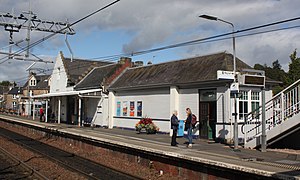Dunblane railway station
 | |||||
| General information | |||||
| Location | Dunblane, Stirling Scotland | ||||
| Coordinates | 56°11′09″N 3°57′57″W / 56.1857°N 3.9657°W | ||||
| Grid reference | NN780009 | ||||
| Managed by | ScotRail | ||||
| Platforms | 3 | ||||
| Other information | |||||
| Station code | DBL | ||||
| History | |||||
| Original company | Scottish Central Railway and Dunblane, Doune and Callander Railway | ||||
| Pre-grouping | Caledonian Railway | ||||
| Post-grouping | LMSR | ||||
| Key dates | |||||
| 22 May 1848 | Opened | ||||
| Passengers | |||||
| 2018/19 | |||||
| 2019/20 | |||||
| 2020/21 | |||||
| 2021/22 | |||||
| 2022/23 | |||||
Listed Building – Category C(S) | |||||
| Designated | 17 October 2002 | ||||
| Reference no. | LB48964[2] | ||||
| |||||
Dunblane railway station serves the town of Dunblane in central Scotland. It is located on the former Scottish Central Railway, between Stirling and Perth and opened with the line in 1848. It is the northernmost station on the National Rail network to be electrified.
Facilities
[edit]
It has three platforms, one which serves as a terminus for trains from Glasgow (Queen Street) and Edinburgh, one which serves trains heading north to Perth, Dundee, Aberdeen and Inverness and the third that serves trains heading south to Glasgow and Edinburgh. These include those that terminate at Dunblane, which travel up the northbound line to the signal box to reverse & cross over to the southbound track before heading back down to the station. The signal box in question now operates only the points and signals here. As part of the now completed electrification, the semaphore signals formerly operated by the signal box within the sections electrified (i.e. not to the north of the station) have been replaced with single aspect electrical signals.
The station is staffed by one person who runs the ticket office and does most jobs around the station. Several plants have been placed around the station by a voluntary group known as 'Dunblane in Bloom'.
- Passenger information system
- Automatic ticket machine (on Platform 1)
- Ticket office and waiting room (Mondays - Saturdays, a.m.)
- CCTV
- Waiting shelters and benches
- Limited car parking to the East
- Parking to the west in the former goods sidings area in conjunction with Tesco parking
- Help point
In September 2014, a new footbridge opened with improved accessibility, and the original footbridge removed.[3] The listed footbridge was re-erected at the heritage Bridge of Dun railway station.[4]
Services
[edit]
The train operating company that serves Dunblane station is ScotRail. Trains generally leave for Edinburgh at 01 and 31 minutes past the hour, and for Glasgow Queen Street at 15 minutes past the hour. The latter now run to/from Dundee, whereas those to Edinburgh start from/terminate here.[5] A limited number of Aberdeen services call at the beginning and end of the day.
On Sundays, there is a local hourly service to Edinburgh and hourly calls each way by the Aberdeen to Glasgow service, along with three Inverness to Glasgow (and vice versa) services. The southbound London North Eastern Railway service between Inverness and London King's Cross also stops here.
| Preceding station | Following station | |||
|---|---|---|---|---|
| Bridge of Allan | ScotRail Edinburgh–Dunblane Line |
Gleneagles | ||
| Bridge of Allan | ScotRail Croy Line |
Terminus | ||
| Stirling | Caledonian Sleeper Highland Caledonian Sleeper |
Gleneagles | ||
| Stirling | London North Eastern Railway East Coast Main Line |
Gleneagles | ||
| Historical railways | ||||
| Bridge of Allan Line and station open |
Scottish Central Railway Caledonian Railway |
Kinbuck Line open; station closed | ||
| Terminus | Dunblane, Doune and Callander Railway Caledonian Railway |
Doune Line and station closed | ||
Dunblane, Doune and Callander Railway
[edit]Dunblane used to be a junction where the present line and the Dunblane, Doune and Callander Railway diverged. This connected at Callander to the Callander and Oban Railway. The line was axed in the Beeching cuts, being formally closed on 1 November 1965 (although traffic beyond Callander had ended five weeks earlier due to a landslide in Glen Ogle).
Parts of the trackbed from near Dunblane to Doune and from Callander to Killin are now cycle paths.
A short section of (unelectrified) track remains on the branch, and is used for storing track maintenance machines, or sometimes even a DMU.
See also
[edit]- Public transport in Perth and Kinross
- Dunblane Hotel, formerly the station's hotel
References
[edit]- ^ Brailsford, Martyn, ed. (December 2017) [1987]. "Gaelic/English Station Index". Railway Track Diagrams 1: Scotland & Isle of Man (6th ed.). Frome: Trackmaps. ISBN 978-0-9549866-9-8.
- ^ "STATION ROAD, DUNBLANE RAILWAY STATION INCLUDING ORIGINAL FOOTBRIDGE". Historic Scotland. Retrieved 3 March 2019.
- ^ Dunblane station's new £3m footbridge opens for Ryder Cup Network Rail 23 September 2014
- ^ "New ridge at Bridge of Dun". Retrieved 3 March 2019.
- ^ GB National Rail Timetable May 2023, Table 212 (Network Rail)
- Butt, R. V. J. (October 1995). The Directory of Railway Stations: details every public and private passenger station, halt, platform and stopping place, past and present (1st ed.). Sparkford: Patrick Stephens Ltd. ISBN 978-1-85260-508-7. OCLC 60251199. OL 11956311M.
- Jowett, Alan (March 1989). Jowett's Railway Atlas of Great Britain and Ireland: From Pre-Grouping to the Present Day (1st ed.). Sparkford: Patrick Stephens Ltd. ISBN 978-1-85260-086-0. OCLC 22311137.
External links
[edit]- Railway stations in Stirling (council area)
- Former Caledonian Railway stations
- Railway stations in Great Britain opened in 1848
- Railway stations served by ScotRail
- Railway stations served by Caledonian Sleeper
- Listed buildings in Dunblane
- William Tite railway stations
- Listed railway stations in Scotland
- Category C listed buildings in Stirling (council area)
- Railway stations served by London North Eastern Railway
